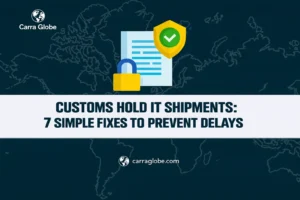Expanding your business to Brazil, one of the world’s largest economies opens up incredible opportunities. However, navigating the import and export process requires a thorough understanding of the country’s regulatory framework.
At the core of these operations is the import export license, a crucial document for businesses aiming to trade goods across Brazil’s borders. Another critical component of Brazil’s trade landscape is the Nota Fiscal, a mandatory electronic invoice that ensures compliance with tax and financial regulations.
What is an Import Export License?
An import & export license is a government-issued authorization that allows businesses to import or export goods legally. In Brazil, this license ensures that all trade activities comply with national and international regulations.
For companies operating in Brazil, obtaining this license is essential to avoid delays, fines, or even confiscation of goods. Learn more about the importance of trade compliance.
Who Needs an Import Export License in Brazil?
In Brazil, any company or individual planning to engage in international trade activities must obtain an import export license. Whether importing raw materials, exporting finished goods, or trading specialized items like electronics or pharmaceuticals, this license is mandatory.
Additionally, every transaction involving the shipment of goods must be accompanied by a Nota Fiscal. This requirement applies to both domestic and international trade activities.
Types of Import Export Licenses in Brazil
Brazil categorizes import export licenses into various types depending on the nature of the goods:
- General Import License: For businesses importing regular goods like textiles, machinery, and consumer products.
- Specialized Licenses: Required for restricted goods like chemicals, medical devices, or agricultural products.
- Export License: For companies exporting goods that require specific compliance, such as agricultural produce or minerals.
What is a Nota Fiscal, and Why Does It Matter?
A Nota Fiscal is an electronic tax document required for all commercial transactions in Brazil, including imports and exports. It serves multiple purposes:
- Tax Compliance: Ensures that all applicable taxes are paid.
- Legal Documentation: Acts as proof of a transaction, vital for audits and disputes.
- Customs Clearance: Required for the movement of goods across borders.
Without a valid Nota Fiscal, businesses risk severe penalties, including shipment delays or fines.
Key Requirements for Import Export Licenses in Brazil
To apply for an import export license in Brazil, businesses must fulfill the following requirements:
- Register with RADAR (Sistema de Rastreamento da Atuação dos Intervenientes Aduaneiros):
- RADAR is a prerequisite for obtaining an import export license. Companies must choose between three categories based on their trading volume:
- Express RADAR: For small-scale trading.
- Limited RADAR: For moderate trading volumes.
- Unlimited RADAR: For large-scale operations. Learn more about RADAR registration.
- RADAR is a prerequisite for obtaining an import export license. Companies must choose between three categories based on their trading volume:
- CNPJ Registration: Companies must have a valid CNPJ (Cadastro Nacional da Pessoa Jurídica), the national registry for legal entities.
- Documentation: Submit essential documents, including:
- Articles of incorporation.
- Proof of tax compliance.
- Bank statements to verify financial stability.
- Compliance with ANVISA or MAPA: If trading goods related to health, food, or agriculture, additional approvals from ANVISA (National Health Surveillance Agency) or MAPA (Ministry of Agriculture, Livestock, and Supply) are required. Check out the ANVISA requirements.
- Proof of Payment of Fees: Pay applicable fees for registration and licensing.
Nota Fiscal:
- Access to the SEFAZ System: Businesses must register with SEFAZ (Secretariat of Finance) to issue electronic invoices.
- Digital Certificate: Required to authenticate and sign the Nota Fiscal electronically.
- Accurate Data Entry: Ensure product descriptions, taxes, and values are correctly filled in the invoice to avoid customs delays.
Steps to Obtain an Import Export License in Brazil
- RADAR Registration:
- Register your business with the Receita Federal do Brasil (Federal Revenue Service) and choose the appropriate RADAR category.
- Apply for the License:
- Submit the application through the Brazilian Trade and Investment Promotion Agency (Apex-Brasil) or the Ministry of Economy. Visit Apex-Brasil.
- Customs Broker Assistance:
- Hiring a certified customs broker simplifies the process, especially for businesses new to Brazil’s trade landscape.
- Approval and Activation:
- Upon approval, the license is activated, allowing you to commence trade operations.
Challenges and How Carra Globe Can Help
Navigating the import export licensing process in Brazil can be complex due to:
- Stringent compliance regulations.
- Bureaucratic procedures.
- Language barriers.
At Carra Globe, we specialize in Importer of Record (IOR) and Exporter of Record (EOR) services, ensuring your goods comply with all Brazilian regulations. From obtaining licenses to managing customs and documentation, we streamline the process so you can focus on growing your business. Learn about our IOR and EOR services.
Why is Compliance Important?
Failure to adhere to Brazil’s import export regulations can result in the following:
- Delays: Goods held at customs due to incomplete documentation.
- Shipment Delays: Missing or incorrect Nota Fiscal information can halt customs clearance.
- Fines: Significant penalties for non-compliance.
- Reputational Damage: Compromised business relationships and lost opportunities.
Benefits of Partnering with Carra Globe
- Expertise in Brazilian Trade Laws: Our team understands the intricacies of Brazil’s import export requirements.
- Efficient License Acquisition: We expedite the licensing process to save time and effort.
- Seamless Operations: From RADAR registration to customs clearance, we handle every aspect with precision.
Securing an import export license in Brazil is an essential step for businesses looking to trade in this vibrant market. While the process can be daunting, a reliable partner like Carra Globe simplifies the journey. With our expertise, you can navigate Brazil’s regulatory landscape with confidence, ensuring your goods reach their destination without hassle.
Contact Carra Globe today to learn how we can assist with your import export licensing needs in Brazil.












